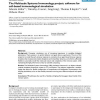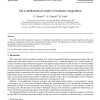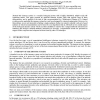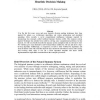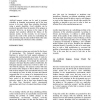124
click to vote
Publication
In an instant classic paper (Lazebnik, in Cancer Cell 2(3); 2002: 179–182) biologist Yuri Lazebnik deplores the poor effectiveness of the approach adopted by biologists to unders...
121
click to vote
SCFBM
2008
15 years 1 months ago
2008
Background: Computer simulations are of increasing importance in modeling biological phenomena. Their purpose is to predict behavior and guide future experiments. The aim of this ...
104
click to vote
APPML
2006
15 years 2 months ago
2006
This work deals with the qualitative analysis of a nonlinear integro-differential model of immune competition with special attention to the dynamics of tumor cells contrasted by t...
117
Voted
CORR
2008
Springer
15 years 2 months ago
2008
Springer
Abstract-The immune system is a complex biological system with a highly distributed, adaptive and selforganising nature. This paper presents an Artificial Immune System (AIS) that ...
130
click to vote
CORR
2008
Springer
15 years 2 months ago
2008
Springer
Over the last few years, more and more heuristic decision making techniques have been inspired by nature, e.g. evolutionary algorithms, ant colony optimisation and simulated annea...
140
click to vote
CORR
2008
Springer
15 years 2 months ago
2008
Springer
Artificial immune system can be used to generate schedules in changing environments and it has been proven to be more robust than schedules developed using a genetic algorithm. Go...
118
click to vote
CORR
2008
Springer
2008
Springer
On the Effects of Idiotypic Interactions for Recommendation Communities in Artificial Immune Systems
15 years 2 months ago
It has previously been shown that a recommender based on immune system idiotypic principles can outperform one based on correlation alone. This paper reports the results of work i...
129
click to vote
CORR
2010
Springer
15 years 2 months ago
2010
Springer
Dendritic cells are antigen presenting cells that provide a vital link between the innate and adaptive immune system, providing the initial detection of pathogenic invaders. Resea...
120
click to vote
CORR
2010
Springer
15 years 2 months ago
2010
Springer
Artificial immune systems, more specifically the negative selection algorithm, have previously been applied to intrusion detection. The aim of this research is to develop an intrus...

